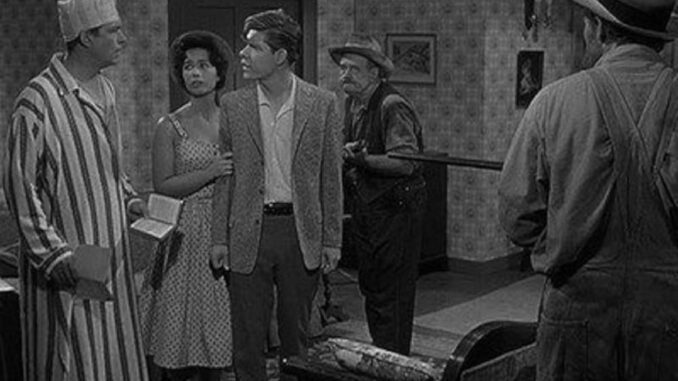
Can Andy End the Feud That Began 87 Years Ago?
The air in the holler hung thick with the scent of honeysuckle and simmering resentment. Eighty-seven years. Eighty-seven years of whispered accusations, averted gazes, and property lines drawn in blood, not ink. The feud between the Holloways and the Caldwells was a gnarled, ancient tree, its roots burrowed deep into the mountain soil, poisoning the very water that sustained them both. And now, Andy Holloway, barely twenty with dirt still clinging to his boots from working the family farm, was being asked to be the lumberjack who finally felled it.
Could he do it? Could he, a boy who remembered playing with little Sarah Caldwell behind the old oak tree, before the weight of the family history crushed the joy from their games, possibly end a feud that had become as much a part of the landscape as the Blue Ridge Mountains themselves?
The feud began, as they often do, with land and pride. A boundary dispute over a lucrative patch of ginseng, a perceived slight at a county fair pie-eating contest, whispers of stolen hogs. The specifics were lost to time, buried under generations of animosity. What remained was a simmering, low-grade hatred, passed down from father to son, mother to daughter. There were no outright acts of violence in recent years, just a relentless pressure of unspoken grievances, a constant awareness of the "other" family, a gnawing feeling that your misfortune was likely their doing.
Andy, though young, possessed a quality rare in those parts: a quiet, unassuming empathy. He saw the weariness in his own father’s eyes, the way the feud had calcified his spirit. He saw the loneliness in old Martha Caldwell's stooped shoulders as she tended her garden, a garden that was ironically bursting with the same vibrant life as his grandmother's across the valley. He recognized that this bitterness was not inherent, but learned, an inheritance as unwanted as a crippling disease.
His first attempt was tentative, almost apologetic. He’d seen young Sarah, now a striking woman with eyes as deep and blue as the mountain sky, struggling with a flat tire on the road. He stopped, not thinking of the Holloway-Caldwell divide, just seeing someone in need. He changed the tire, offering a polite, "You be careful now." Sarah, initially wary, softened as she realized the sincerity in his gaze. "Thank you, Andy," she said, the sound of his name on her lips like a forgotten melody.
This small act of kindness, as insignificant as it seemed, rippled through the community. Whispers traveled faster than the wind on the mountain. Some were hopeful, some cynical. His own father, a man etched with the lines of the feud, simply shook his head. "Don't you go getting soft on me, boy," he warned, but Andy could see a flicker of something else in his eyes – a yearning, perhaps, for a world where such simple acts of neighborliness were commonplace.
Andy continued his quiet campaign. He offered a hand when the Caldwell barn needed repair, anonymously donated blankets to their church during a particularly harsh winter, even rescued their lost dog, a scraggly mutt that was the spitting image of one his grandfather used to own. Each act was a small crack in the wall of animosity, a chink in the armor of ingrained hatred.
However, the feud wasn’t just about land or hogs; it was about identity. It was a story told and retold, a narrative that defined them both. Letting go meant questioning everything they had always believed, facing the possibility that all the bitterness and resentment had been for naught. For many, that was a price too high to pay.
The real test came during the annual Harvest Festival. The air crackled with anticipation as both families set up their booths, showcasing their bounty. The atmosphere was taut, thick with unspoken rivalry. Then, disaster struck. A sudden, unexpected storm ripped through the valley, scattering displays, flooding tents, and leaving a trail of destruction in its wake.
Andy, without hesitation, plunged into the chaos, helping anyone in need, Holloway or Caldwell alike. He secured collapsing tents, rescued waterlogged produce, and helped clear debris. In the midst of the storm, he saw old Jedediah Caldwell, Sarah's grandfather, struggling to salvage his prize-winning pumpkins. Andy, without a word, joined him. Working side-by-side, drenched and exhausted, they saved what they could.
That night, huddled under the leaky roof of the community hall, sharing lukewarm coffee and salvaged biscuits, a fragile truce was born. The storm, a force of nature indifferent to their petty squabbles, had humbled them both. Jedediah, his face lined with weariness and something akin to gratitude, finally met Andy's gaze. "Your grandpappy," he said gruffly, "he was a stubborn one." Andy nodded, remembering the stories he'd heard. "So was yours, I reckon." They shared a small, hesitant smile.
The feud wasn't over, not entirely. Eighty-seven years couldn't be erased overnight. But in that shared coffee cup, in that shared struggle against the storm, a seed of hope had been planted. Andy couldn’t single-handedly eradicate the deep-seated animosity, but he had shown them a different path, a path of kindness, empathy, and shared humanity.
Could Andy end the feud? The answer is complex. He couldn't force reconciliation, but he could be the catalyst. He could be the gentle rain that slowly erodes the hard soil of resentment, allowing new seeds of understanding and forgiveness to take root. The future was uncertain, but one thing was clear: Andy Holloway had planted the first seed, and in the fertile ground of the human heart, even the most ancient feud could eventually wither and die, replaced by something new and beautiful.